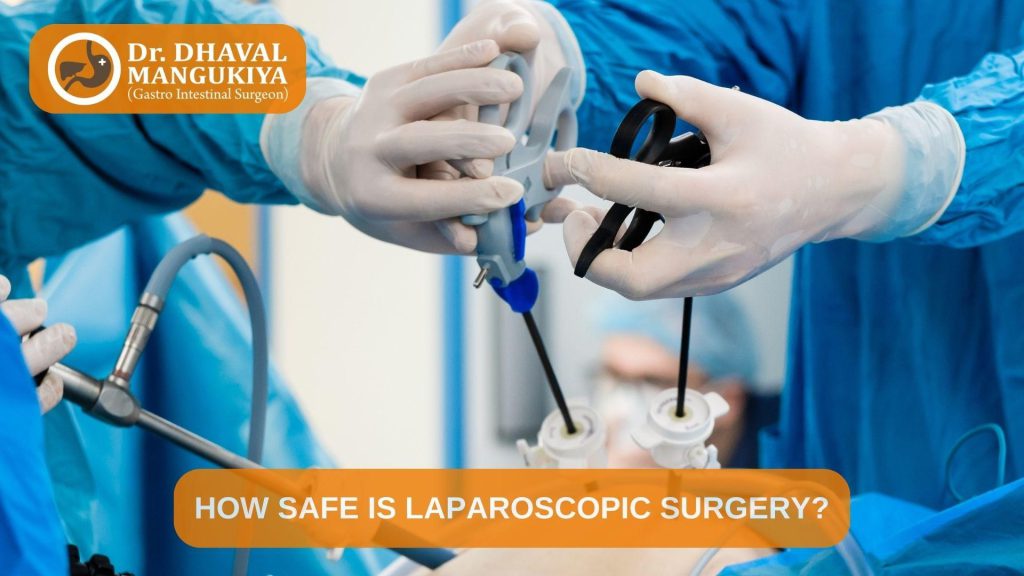In the ever-evolving landscape of medical advancements, laparoscopic surgery has emerged as a revolutionary technique, offering patients a minimally invasive alternative to traditional open procedures. As with any medical intervention, questions and concerns arise. We discussed the intricacies of the procedure, delved into the safety of laparoscopic surgery, and the crucial aspects of pre- and post-operative care with Dr Dhaval Mangukiya, one of the best laparoscopic surgeons in Surat.
How Safe is Laparoscopic Surgery?
Laparoscopic surgery, also known as minimally invasive surgery, is generally considered safe and effective. Unlike open surgery, which involves large incisions, laparoscopic procedures utilize small incisions through which a camera and specialized instruments are inserted. This approach minimizes trauma to the body, reduces the risk of infection, and promotes faster recovery.
However, as with any medical procedure, there are potential risks, points Dr Dhaval Mangukiya, one of the best gastrointestinal surgeons in Surat. In rare cases, complications such as bleeding, infection, or damage to surrounding organs may occur. It’s essential to discuss your specific case and any concerns with your surgeon, who can provide personalized information based on your health and medical history.
How Many Holes are Made in Laparoscopic Surgery?
One common question about laparoscopic surgery is related to the number of incisions or “holes” made during the procedure. Typically, laparoscopic surgery involves multiple small incisions, ranging from one to five, depending on the complexity of the surgery. These incisions serve as entry points for the camera and instruments necessary for the surgeon to perform the operation. The small size of these incisions contributes to reduced scarring and a quicker recovery time compared to traditional open surgery.
Sleep After Laparoscopic Surgery
Recovery from laparoscopic surgery involves a crucial component — adequate sleep. While discomfort and pain may be present initially, Dr Dhaval Mangukiya, one of the best gastro surgeons in Surat, will prescribe medications to manage pain and help you sleep. It’s essential to follow their recommendations regarding the use of pain medication to ensure a restful sleep and support the healing process.
During the first few nights post-surgery, it’s advisable to sleep on your back to minimize strain on the incision sites. Using pillows to support your body and finding a comfortable sleeping position can enhance your overall sleep quality. If you experience persistent issues with sleep or pain, promptly communicate with your healthcare team for guidance.
Can I Eat Before a Laparoscopic Surgery?
The question of whether you can eat before laparoscopic surgery is common, and the answer depends on the type of surgery and your surgeon’s recommendations. In many cases, patients are instructed to refrain from eating or drinking for a specific period before the surgery to reduce the risk of complications during anaesthesia.
Fasting guidelines are typically provided by your surgical team, and it’s crucial to adhere to these instructions strictly. Proper fasting helps ensure a smooth induction of anaesthesia and minimizes the potential for complications during and after the procedure.
What to Eat After Laparoscopic Surgery?
Postoperative nutrition plays a vital role in the recovery process. Initially, you may start with clear liquids and progress to a soft diet as tolerated. Broths, gelatine, and clear juices can provide essential hydration and nutrients. As your body heals, you can gradually reintroduce solid foods.
It’s essential to focus on a balanced diet that includes protein, vitamins, and minerals to support tissue repair and boost your immune system. Consult with your healthcare team or a registered dietitian to create a customized nutrition plan tailored to your specific needs and recovery timeline.
What is the Recovery Time After a Laparoscopic Surgery?
The recovery time after laparoscopic surgery varies depending on the complexity of the procedure and individual factors such as overall health and adherence to postoperative care instructions. In general, patients can expect a faster recovery compared to traditional open surgery.
While some individuals may resume normal activities within a week, others may require a few weeks before returning to work or engaging in strenuous activities. It’s crucial to follow Dr Dhaval Mangukiya, one of the best gastro surgeons in Surat, postoperative care plan, attend follow-up appointments, and communicate any concerns promptly.
Conclusion:
Laparoscopic surgery has revolutionized the field of surgery, offering a safer and less invasive alternative for many patients. Understanding the safety aspects, the number of incisions involved, and the importance of sleep and nutrition in the recovery process empowers individuals to navigate their surgical journey with confidence. Always consult with your healthcare team for personalized advice and guidance tailored to your unique needs.

